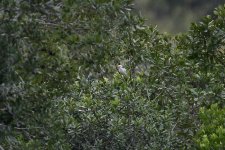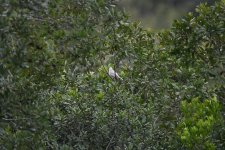Hi everyone,
I'm guessing the bird in question is leucistic not albino because the bill is blackish-grey - honesty have never seen either before so not sure.
As for an ID, when I first saw it I thought some sort of flycatcher and I suppose that is what I still think it is. Though I understand it may well be impossible to get species level id, any ideas are appreciated. Photos were taken from quite a distance and I appreciate this makes deciphering any key details all the more difficult.
The sighting is from Bush Lodge, Queen Elizabeth NP (Uganda), June 2021. The area was like a swamp (not sure if it helps, but I've attached a photo) with lots of birds but we didn't see any other species that looked similar to the bird in question.
thanks!





I'm guessing the bird in question is leucistic not albino because the bill is blackish-grey - honesty have never seen either before so not sure.
As for an ID, when I first saw it I thought some sort of flycatcher and I suppose that is what I still think it is. Though I understand it may well be impossible to get species level id, any ideas are appreciated. Photos were taken from quite a distance and I appreciate this makes deciphering any key details all the more difficult.
The sighting is from Bush Lodge, Queen Elizabeth NP (Uganda), June 2021. The area was like a swamp (not sure if it helps, but I've attached a photo) with lots of birds but we didn't see any other species that looked similar to the bird in question.
thanks!











